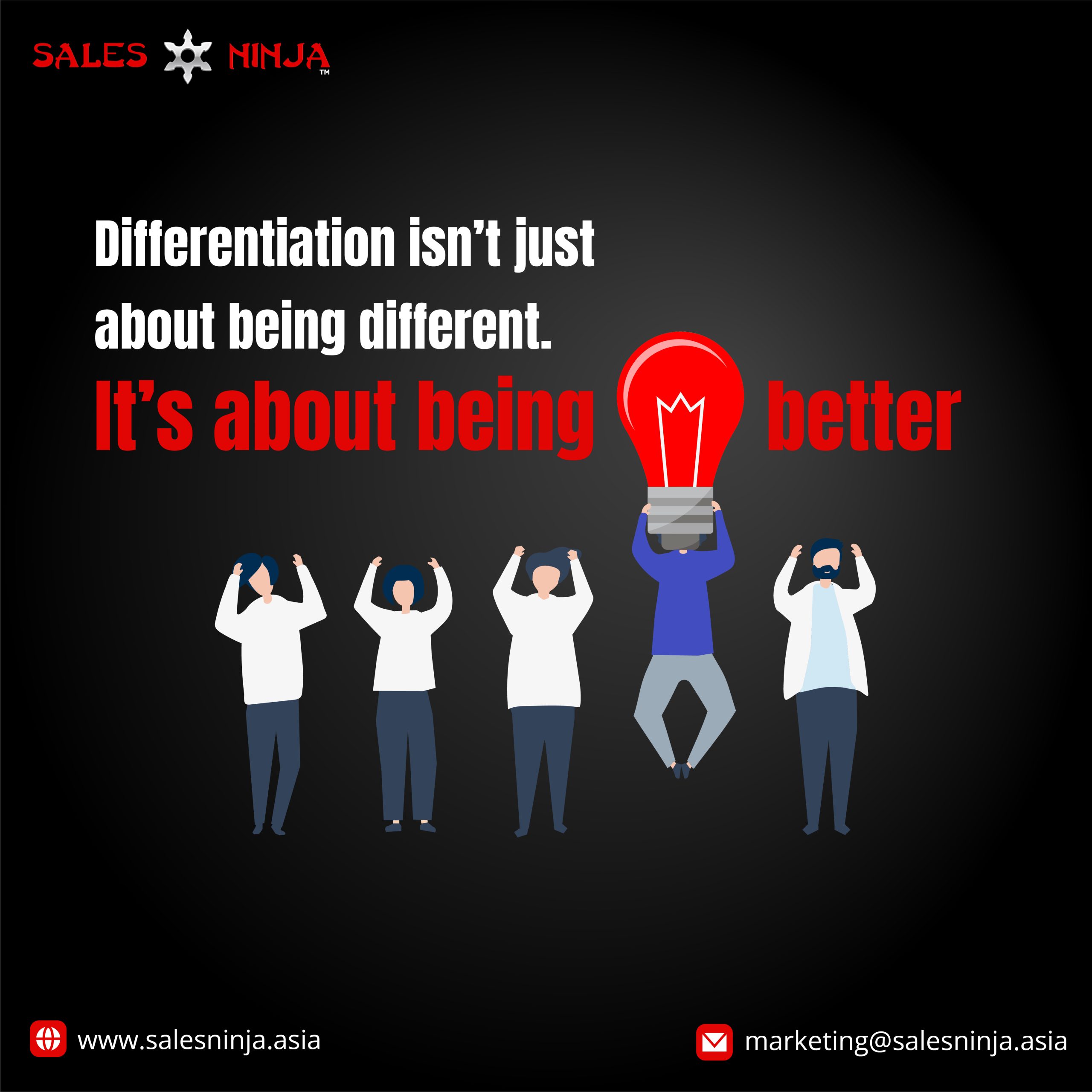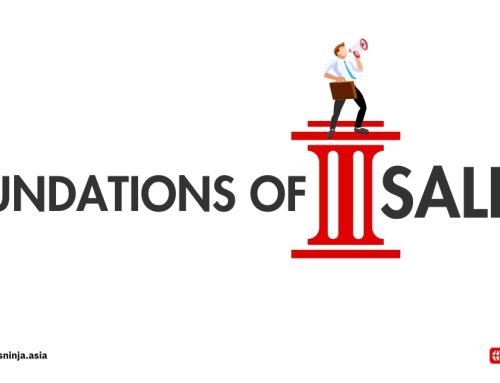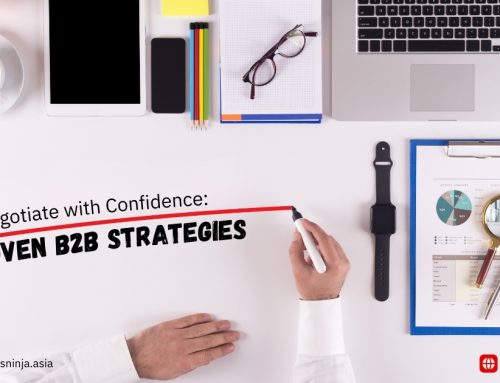In the case of B2B marketing, the big challenge is to make your product or service stand out and convince potential customers that it’s the best choice for what they need. But here’s the question: How can you make your B2B product or service different from all the other options out there? The answer is – ‘Differentiation.’ Becoming really good at differentiation in B2B sales is like having a secret superpower.
With that in mind, in this blog post, we’ll take a closer look at differentiation in B2B sales. We’ll explore what it means, why it’s important, how it actually works, and most importantly, how you can become a master differentiator.
Understanding Differentiation in Sales

Differentiation just about being different. It’s About being better.
Differentiation, in the context of B2B sales, refers to the process of setting your product or service apart from the competition in the eyes of potential customers. It’s about answering a fundamental question: “Why should a customer choose you over your competitors?” To answer this question effectively, you need to showcase what makes your offering unique and valuable.
Why do we need Differentiation?
Imagine a crowded marketplace with lots of similar options. It’s easy for customers to get confused. That’s where differentiation comes in. It’s like shining a spotlight on what makes you special. When you differentiate, you’re showing potential customers why picking you is the best choice. It’s not just about having a better product or service; it’s about explaining how you can solve their problems and meet their needs. Without differentiation, you might blend in with others, making it hard for customers to see why you’re unique. So, in B2B sales, differentiation is not just a strategy; it’s a must for getting noticed and winning customers.
How to Differentiate in B2B Sales
The journey begins by understanding your target audience deeply and recognizing their needs and pain points. Once you grasp your audience’s essence, it’s time to introspect and identify your competitive advantages. These could range from unique features to exceptional support. Now, take these advantages and tailor your offerings to provide specific solutions to your audience’s problems. Crafting a Unique Value Proposition (UVP) is the core, succinctly conveying why your solution is special. Concrete evidence through case studies reinforces your claims.
Consistency in branding and messaging across all touchpoints ensures a seamless experience for clients. But differentiation is not static; it’s an ever-evolving commitment. Embrace continuous improvement, keeping your product or service ahead of market trends.
In short, differentiation in B2B sales is a comprehensive journey of understanding, self-reflection, adaptation, and continuous improvement. It’s the means to capture the attention of discerning clients and secure those pivotal deals that elevate your business.
What Needs to Be Differentiated?
To truly master differentiation in B2B sales, one must first understand what elements need differentiation. This comprehensive guide explores every facet of this critical question, delving into the intricacies of B2B sales and highlighting the key areas that demand differentiation.

Why are you Unique
-
Products and Services: The Foundation of Differentiation
At the core of every B2B transaction lies the product or service being offered. To differentiate effectively, businesses must scrutinize their offerings. What sets your product or service apart from the competition? Is it a unique feature, enhanced functionality, superior quality, or a competitive price point? It’s essential to identify these differentiating factors clearly. For instance, if you’re selling software solutions, highlighting innovative features or integrations that competitors lack can be a compelling differentiator.
-
Value Proposition: Communicating Unique Benefits
Your value proposition is the bridge between your offerings and the needs of your customers. In B2B sales, it’s crucial to convey how your product or service solves specific problems or fulfills critical needs better than alternatives. The value proposition should answer the question: “Why should a customer choose you over your competitors?” Crafting a compelling value proposition requires a deep understanding of your customers’ pain points and desires. Consider providing quantifiable benefits, such as cost savings, increased efficiency, or revenue growth, to reinforce your differentiation.
-
Customer Experience: Delivering Exceptional Service
The customer experience is an often underestimated but potent differentiator. B2B clients value exceptional service and support. Being responsive, knowledgeable, and willing to go the extra mile can set your business apart, especially in industries where support is lacking. Consider how your customer support and service can outshine competitors. It’s not just about solving issues; it’s about building lasting relationships with clients by making their experience seamless and delightful.
-
Pricing Strategy: Competitive and Value-Based Pricing
Pricing is a critical aspect of differentiation in B2B sales. Businesses must decide whether they want to compete on price or offer premium, value-based pricing. Competing on price can be a race to the bottom, eroding profit margins. Alternatively, offering value-based pricing justifies higher costs by emphasizing the unique benefits and value delivered. This approach demands clear communication of your product or service’s superior features and outcomes that justify the higher price tag.
-
Customization and Personalization: Tailoring to Client Needs
One size rarely fits all in B2B sales. Differentiation often involves tailoring your offerings to meet the specific needs of individual clients or industries. Customization can range from adjusting product features to providing personalized service. For instance, if you offer marketing software, allowing clients to customize their dashboards or reports can be a compelling differentiator. Demonstrating your willingness to adapt and personalize your offerings fosters a sense of partnership with clients.
-
Brand Image and Reputation: Building Trust and Recognition
A strong brand image and reputation are invaluable in B2B sales. Trust and recognition can be differentiators in themselves. Businesses that have cultivated a positive reputation for reliability, quality, and ethical practices often find it easier to attract and retain clients. Consistency in branding and messaging reinforces your differentiation strategy. Ensure that your entire business, from website design to customer interactions, reflects your unique value proposition. A consistent brand image fosters trust and recognition among your target audience.
-
Technological Innovation: Staying Ahead of the Curve
Innovation is a driving force in B2B differentiation. The ability to offer cutting-edge technology, features, or solutions can set your business apart. Regularly updating your products or services with new features and enhancements, especially in fast-paced industries like tech, ensures that you continue to stand out. Moreover, technology can simplify complex processes, enhance user experiences, and boost overall efficiency, all of which can be significant selling points.
-
Sustainability and Social Responsibility: Appealing to Ethical Buyers
In today’s world, an increasing number of B2B buyers are conscious of sustainability and social responsibility. If your business can demonstrate a commitment to environmental or social causes, it can be a compelling differentiator. Highlighting eco-friendly practices, ethical sourcing, or community engagement initiatives can attract clients who align with these values. Sustainability isn’t just an ethical consideration; it’s a strategic differentiator in a world where corporate responsibility matters.
-
Sales Process and Engagement: Delivering Exceptional Interactions
The way you engage with clients throughout the sales process can differentiate your business. Providing a seamless, informative, and responsive experience can leave a lasting impression. Ensure that your sales team is well-trained, knowledgeable about your offerings, and equipped to answer questions effectively. Going beyond the transactional aspect to build relationships and offer valuable insights can be a differentiator. In essence, your sales process should mirror your commitment to exceptional service.
-
Accessibility and Convenience: Simplifying Client Interactions
Making it easy for clients to interact with your business can set you apart. Offering user-friendly interfaces, convenient communication channels, and accessible customer support can enhance the client experience. Clients value businesses that prioritize their convenience and are responsive to their needs. Streamlining processes, reducing friction, and being readily available can all contribute to differentiation.
-
Client Relationships: The Foundation for Long-Term Success
Finally, fostering strong client relationships can be the most potent differentiator. Clients who see your business as a valuable partner, rather than a transactional vendor, are more likely to stay loyal and even become advocates for your brand. Building trust, offering personalized solutions, and consistently delivering exceptional service form the foundation of enduring client relationships.
Strategies for Effective Differentiation in B2B Sales
To truly excel in the art of differentiation within the realm of B2B sales, let’s explore some strategies and tips:
-
Know your differentiation factors
Knowing your differentiation factors involves a deep understanding of your products, personal strengths, company reputation, and client needs. To effectively differentiate yourself and your offerings, you must first understand what sets you apart from the competition. Start by analyzing your products or services. What unique features, benefits, or advantages do they offer? Consider factors like quality, pricing, customization, or innovative solutions.
Identifying these differentiators allows you to communicate their value to potential clients. Next, assess your personal strengths and expertise. What skills, knowledge, or experiences do you bring to the table that can benefit your clients? Highlight these attributes during interactions with clients to build trust and credibility. Additionally, delve into your company’s strengths and reputation. Positive reviews, case studies, and success stories can bolster your differentiation strategy.Lastly, understand your target audience’s needs and preferences. Tailor your approach to align with their specific challenges and goals. By focusing on what matters most to them, you can position yourself as a valuable partner.
-
Understand Your Audience
To truly connect with your customers, you need to delve into their world. Start by asking the right questions and actively listening to their responses. Engage with your customers regularly, whether through meetings, emails, or even social media. Stay updated on their industry trends and challenges. Utilize data and analytics to track customer behavior and preferences. Encourage customers to share their thoughts, both positive and negative. This valuable information can guide your sales strategies, helping you anticipate their needs and stay one step ahead.
-
Do your competitor Analysis
Begin by identifying who your primary competitors are. Once you’ve pinpointed them, delve into their strengths and weaknesses. Analyze their customer reviews, market positioning, and any unique selling propositions they may have. Try to understand their customer base. Who are their top clients, and what are their pain points?Finding ways to address these problems more effectively than your competitors can make a huge difference. Additionally, keep an eye on your competitors’ marketing and sales tactics. Are they using content marketing, social media, or other strategies effectively? By learning from their successes and failures, you can refine your own sales approach. Regularly revisit and update your analysis to stay ahead in the competitive world of B2B sales.
-
Initiate Meaningful Engagement with Buyers
Instead of waiting for buyers to come to you, take the first step. Why? Because when buyers finally get in touch with you, they often already have an idea of what they want and have looked at other companies. It’s better to start connecting with buyers early in their decision-making process. Keep in mind that other sellers are also trying to get their attention. You don’t want to be the last option they consider. That’s why it’s vital to proactively reach out and engage with potential customers. This approach sets you apart and increases your chances of success in sales.
-
Implement What You Advocate
In B2B sales, it’s not just about talking; it’s about walking the walk. If you want to stand out and build trust with your customers, you need to implement the solutions and practices you advocate. Think about it from the buyer’s perspective. They’re bombarded with sales pitches every day. Many sellers promise the moon and stars, but how often do they deliver on those promises? Buyers are skeptical, and they should be. To set yourself apart, be the seller who practices what they preach.
If you advocate for innovative solutions, use them in your own operations. If you talk about exceptional customer service, provide it consistently. When you implement the strategies and products you recommend, you demonstrate authenticity and credibility. Mastering differentiation is an ongoing journey. It requires a deep understanding of your market, competitors, and customers, coupled with the ability to articulate your unique value clearly.
By continuously refining your differentiation strategies and staying attuned to the evolving needs of your clients, you can become a true master of the art, standing out in a crowded marketplace and reaping the rewards of long-term success.
For a deeper dive into the world of B2B sales and to unlock your full potential as a B2B sales expert, consider enrolling in our ‘B2B Sales Ninja: Target any customer you want- AI powered’ training program.







Leave A Comment